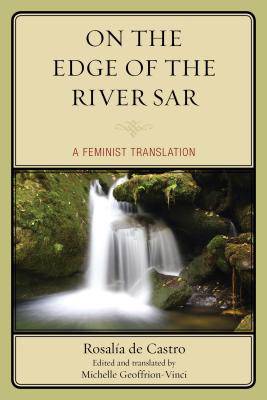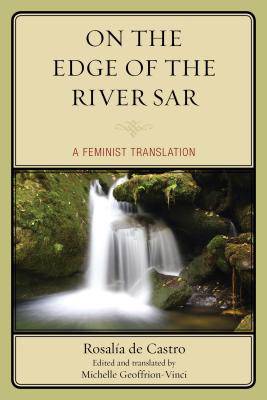
Bedankt voor het vertrouwen het afgelopen jaar! Om jou te bedanken bieden we GRATIS verzending aan op alles gedurende de hele maand januari.
- Afhalen na 1 uur in een winkel met voorraad
- Gratis thuislevering in België
- Ruim aanbod met 7 miljoen producten
Bedankt voor het vertrouwen het afgelopen jaar! Om jou te bedanken bieden we GRATIS verzending aan op alles gedurende de hele maand januari.
- Afhalen na 1 uur in een winkel met voorraad
- Gratis thuislevering in België
- Ruim aanbod met 7 miljoen producten
Zoeken
€ 205,45
+ 410 punten
Uitvoering
Omschrijving
This book presents the first feminist translation of Rosalía de Castro's seminal poetic anthology En las orillas del Sar [On the Edge of the River Sar] (1884).
Rosalía de Castro (1837-1885) was an artist of vast poetic vision. Her understanding of human nature and her deep sensitivity to the injustices suffered by women and by such marginalized peoples as those of her native region, Galicia, are manifest in verses of universal yet rarely translated significance. An outspoken proponent of both women's rights and her region's cultural and political autonomy, Castro used her poetry as a vehicle through which to decry the crushing hardships both groups endured as Spain vaulted between progressive liberal and conservative reactionary political forces throughout the nineteenth century. Depending upon what faction held sway in the nation at any given time during Castro's truncated literary career, her works were either revered as revolutionary or reviled as heretical for the views they espoused. Long after her death by uterine cancer in 1885, Castro was excluded from the pantheon of Spanish literature by Restoration society for her unorthodox views. Compellingly, the poet's conceptualization of the individual and the national self as informed by gender, ethnicity, class, and language echoes contemporary scholars of cultural studies who seek to broaden present-day definitions of national identity through the incorporation of precisely these same phenomena.
Thanks to the most recent works in Rosalian and Galician studies, we are now able to recuperate and reevaluate Rosalía de Castro's poems in their original languages for the more radical symbolism and themes they foreground related to gender, sexuality, race and class as they inform individual and national identities. However, although Castro's poetic corpus is widely accessible in its original languages, these important features of her verses have yet to be given voice in the small number of English translations of only a sub-set of her works that have been produced in the last century. As a result, our understanding of Castro's potential contributions to contemporary world poetries, gender studies, Galician and more broadly cultural studies is woefully incomplete. An English translation of Castro's works that is specifically feminist in its methodological orientation offers a unique and thought-provoking means by which to fill this void.
Rosalía de Castro (1837-1885) was an artist of vast poetic vision. Her understanding of human nature and her deep sensitivity to the injustices suffered by women and by such marginalized peoples as those of her native region, Galicia, are manifest in verses of universal yet rarely translated significance. An outspoken proponent of both women's rights and her region's cultural and political autonomy, Castro used her poetry as a vehicle through which to decry the crushing hardships both groups endured as Spain vaulted between progressive liberal and conservative reactionary political forces throughout the nineteenth century. Depending upon what faction held sway in the nation at any given time during Castro's truncated literary career, her works were either revered as revolutionary or reviled as heretical for the views they espoused. Long after her death by uterine cancer in 1885, Castro was excluded from the pantheon of Spanish literature by Restoration society for her unorthodox views. Compellingly, the poet's conceptualization of the individual and the national self as informed by gender, ethnicity, class, and language echoes contemporary scholars of cultural studies who seek to broaden present-day definitions of national identity through the incorporation of precisely these same phenomena.
Thanks to the most recent works in Rosalian and Galician studies, we are now able to recuperate and reevaluate Rosalía de Castro's poems in their original languages for the more radical symbolism and themes they foreground related to gender, sexuality, race and class as they inform individual and national identities. However, although Castro's poetic corpus is widely accessible in its original languages, these important features of her verses have yet to be given voice in the small number of English translations of only a sub-set of her works that have been produced in the last century. As a result, our understanding of Castro's potential contributions to contemporary world poetries, gender studies, Galician and more broadly cultural studies is woefully incomplete. An English translation of Castro's works that is specifically feminist in its methodological orientation offers a unique and thought-provoking means by which to fill this void.
Specificaties
Betrokkenen
- Auteur(s):
- Uitgeverij:
Inhoud
- Aantal bladzijden:
- 262
- Taal:
- Engels
Eigenschappen
- Productcode (EAN):
- 9781611476798
- Verschijningsdatum:
- 16/10/2014
- Uitvoering:
- Hardcover
- Formaat:
- Ongenaaid / garenloos gebonden
- Afmetingen:
- 157 mm x 245 mm
- Gewicht:
- 517 g

Alleen bij Standaard Boekhandel
+ 410 punten op je klantenkaart van Standaard Boekhandel
Beoordelingen
We publiceren alleen reviews die voldoen aan de voorwaarden voor reviews. Bekijk onze voorwaarden voor reviews.












